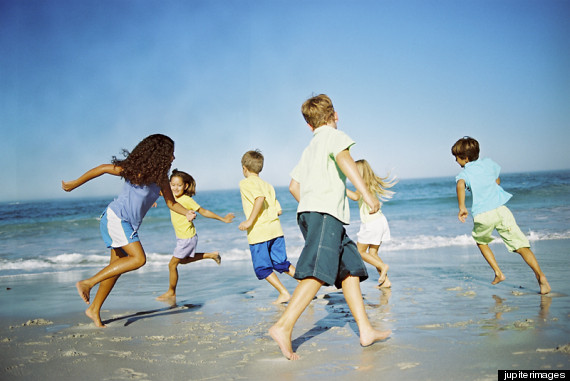
Robin Williams once said, "The world is open for play." But how often, in the midst of the daily grind, does it really feel that way?
When we measure our lives in to-do lists and devote every moment to being productive, play, of course, falls by the wayside. Living in a culture of busyness, productivity and overwork, we condition our brains to do things in order to get them done; to always achieve, accomplish, finish, check off. Even when we do pursue fun, adventurous experiences, it's often for the purpose of ticking them off of a bucket list.
Our disdain for play, silliness and pure nonsense is even reflected in our vocabulary. "No-nonsense" people, who take themselves and their work seriously -- and have no time for activities that don't further their goals -- are celebrated and held up as examples to be followed. But a little nonsense in your day may be a very good thing, not only to boost your mood but also as a way to remind yourself that work (and life) can actually be fun.
"In play an adult can become like a child, fully absorbed in the here-and-now," philosopher Mark Rowlands wrote in Aeon Magazine. "Play, not work, brings us fully to life."
Author and researcher Brené Brown, when studying the habits of courageous, authentic people, noticed that they had one big thing in common: They "goofed off."
"Play -- doing things just because they're fun and not because they'll help achieve a goal -- is vital to human development," Brown wrote in The Huffington Post.
Play and a love of nonsense come naturally to us as children, but when we grow up, we forget how to enjoy time spent without productivity or apparent purpose. Here are five good reasons to bring a little play back into your life.
Playing is as natural to us as eating or sleeping.

Whether they grow up in affluent areas, war zones, or poverty-stricken areas, all children play. The UN Office of the High Commissioner for Human Rights has even recognized play as a fundamental right of every child.
But our need for playtime doesn't end when we hit adulthood, according to Stuart Brown, a psychologist and founder of the National Institute for Play.
“Think about a life without play… try and imagine a culture and a life without play,” Brown said in a 2008 TED talk. “The thing that’s so unique about our species is that we’re really designed to play throughout our whole lifetime.”
Play is inherently worthwhile.

Our society's zeal for productivity leaves little room for play in adulthood, and increasingly, early childhood.
"Today’s world is a deeply utilitarian one, where everything must have a use or be ‘good for something,'" Rowlands, the philosopher, wrote. "Our lives are dominated by work and, unless we have been extraordinarily lucky, we work not because we particularly enjoy it but to get paid."
As Rowlands explains, work is an activity with instrumental value: We work for the sake of earning money, and we want to earn money so that we can take care of ourselves and our loved ones -- but almost never do we work purely for the sake of work itself. In fact, there are very few things in life that we pursue purely for their own value, apart from any hope of compensation.
"A life that is taken up with work and nothing else is a life where everything is done for the sake of something else," Rowlands wrote. "Value is never found in the here and now. The things that have value lie always just a little further down the road."
If we don't do things for their own sake, according to Rowlands, we're always deferring satisfaction. Play, an act of pure spontaneity and enjoyment, anchors us in the present moment and helps us to find contentment in the now.
Play reminds us not to take life so seriously.

In her professional, 9-to-5 life, Lisa Bloom is a 52-year-old author, litigator, NBC legal analyst and mother of two grown children. But for one week each year, she's a burner -- letting loose, dressing up in silly costumes and engaging in spontaneous free play all day long at Burning Man, the annual art and counterculture festival in the Nevada desert.
Bloom says it's easy, in the grind of daily life, for play to fall to the bottom of her to-do list. She loves going to Burning Man because it reminds her of the importance of taking time for play.
"There comes a point in life where we work, and then we work, and we work some more. Even in my off-hours, the reptilian part of my brain reminds me that I should send another email, research another point, make a note to call that guy," Bloom wrote on Yahoo!. "At the end of a long day, or on a Sunday night when [my fiancé and I] have worked straight through another weekend, we remind ourselves: We need to go out and have fun. We exhaustedly add that to the to-do list, where it languishes with the other low-priority items."
At Burning Man, however, "the primary activity is play," she explains. "The heaviness of life sloughs off our backs as we do, and we become light, young, and airy. We climbed a jungle gym dome and hurled ourselves onto a pile of foam logs."
It's not difficult to see why Burning Man -- one of the very few places where adult play and silliness is celebrated -- is also beloved among the Silicon Valley set. Tech world leaders like Mark Zuckerberg, Larry Page, and Elon Musk have frequented the event, which has in recent years become a creative incubator for techies, who use the time to let loose and come up with new ideas.
Watching silly videos makes us feel happy and creative.

Taking a moment out of your day to watch a baby playing with a puppy or a Grandma react to Nicki Minaj's "Anaconda" video might feel like a time-wasting diversion, but research shows that taking a little break to enjoy a silly video -- in addition to being pleasant -- could actually serve a purpose.
A 2010 study published in the Journal of Psychological Science found that watching funny videos on the Internet can trigger a good mood, and in doing so, boost creative thinking. Specifically, they found that being in a positive mood after watching a video of a baby laughing and listening to an upbeat Mozart piece performed better at a pattern-recognition task than subjects who watched sad videos or those who did not watch a video at all.
“If you have a project where you want to think innovatively, or you have a problem to carefully consider, being in a positive mood can help you to do that,” University of Western Ontario researcher Ruby Nadler said.
Any work can become play.

Play, both in childhood and adulthood, is essential to creative, original thinking. When we take ourselves and our work too seriously, it becomes significantly more difficult to think creatively and get absorbed in our work. Research has even shown that the way we think of a task -- as work, or as play -- affects how we carry it out.
According to Harvard psychologist Ellen Langer, the dichotomy we've created between work and play is an artificial one. So when we think of what we must do as "work," we become attached to the outcome rather than the process, which prevents us from enjoying the task and performing it with optimal creativity. But in any task, we have the choice to see it as play.
“As soon as you see something as work, people tend to be very evaluative and to think that there’s only one way of doing it," Langer told The Huffington Post. "They think the mindset for work is typically unpleasant. So if you begin a task thinking it has to be great and have a lot riding on whatever you’re doing, you’re going to be stressed and its going to be hard to actually do it.”
But if we think of the task as play, at least finding some way to shift our focus from how the work will be evaluated to finding some enjoyment in the process, we can find more ease and creativity.
"There's no task that can't be made into fun," Langer said. "If you put the stress aside and actively engage in what you're doing, it will be fun."